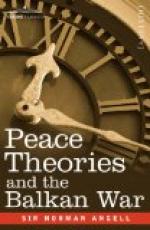We generally think of the primitive life of man—that of the herdsman or the tent liver—as something idyllic. The picture is as far as possible from the truth. Those into whose lives economics do not enter, or enter very little—that is to say, those who, like the Congo cannibal, or the Red Indian, or the Bedouin, do not cultivate, or divide their labour, or trade, or save, or look to the future, have shed little of the primitive passions of other animals of prey, the tigers and the wolves, who have no economics at all, and have no need to check an impulse or a hate. But industry, even of the more primitive kind, means that men must divide their labour, which means that they must put some sort of reliance upon one another; the thing of prey becomes a partner, and the attitude towards it changes. And as this life becomes more complex, as the daily needs and desires push men to trade and barter, that means building up a social organisation, rules and codes, and courts to enforce them; as the interdependence widens and deepens it necessarily means disregarding certain hostilities. If the neighbouring tribe wants to trade with you they must not kill you; if you want the services of the heretic you must not kill him, and you must keep your obligation towards him, and mutual good faith is death to long-sustained hatreds.
You cannot separate the moral from the social and economic development of a people, and the great service of a complex social and industrial organisation, which is built up by the desire of men for better material conditions, is not that it “pays” but that it makes a more interdependent human society, and that it leads men to recognise what is the best relationship between them. And the fact of recognising that some act of aggression is causing stocks to fall is not important because it may save Oppenheim’s or Solomon’s money but because it is a demonstration that we are dependent upon some community on the other side of the world, that their damage is our damage, and that we have an interest in preventing it. It teaches us, as only some such simple and mechanical means can teach, the lesson of human fellowship.
And it is by such means as this that Western Europe has in some measure, within its respective political frontiers, learnt that lesson. Each has learnt, within the confines of the nation at least, that wealth is made by work, not robbery; that, indeed, general robbery is fatal to prosperity; that government consists not merely in having the power of the sword but in organising society—in “knowing how”; which means the development of ideas; in maintaining courts; in making it possible to run railways, post offices, and all the contrivances of a complex society.




